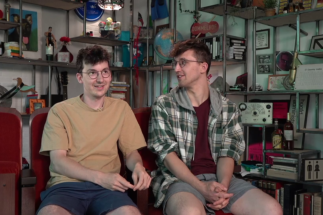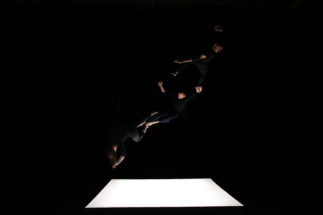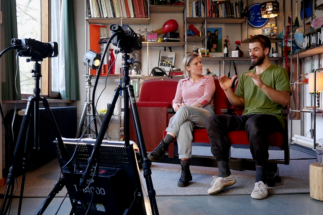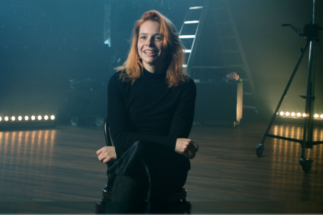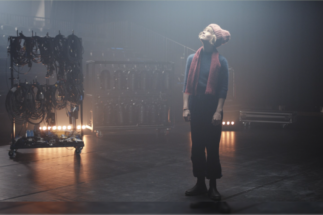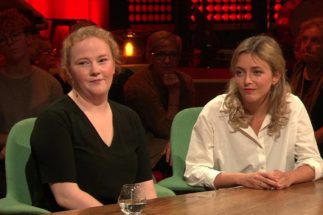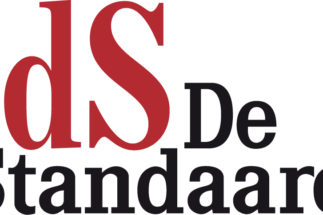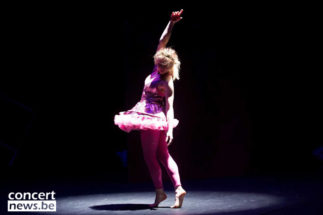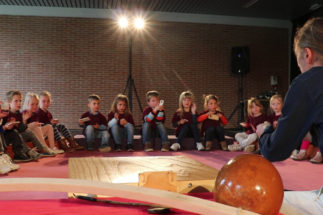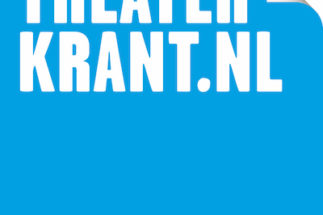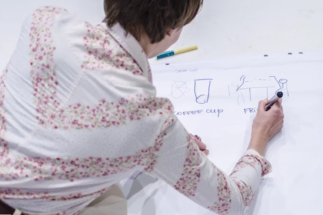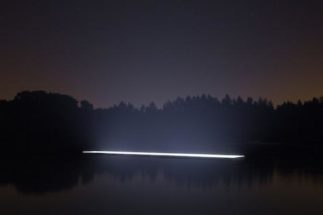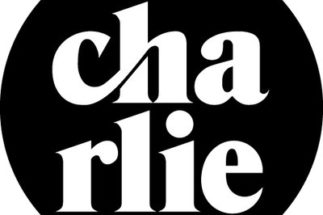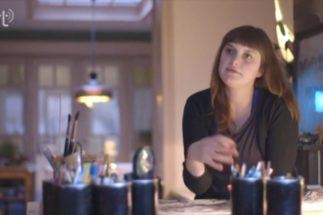Rudy Trouvé
16.10.2007
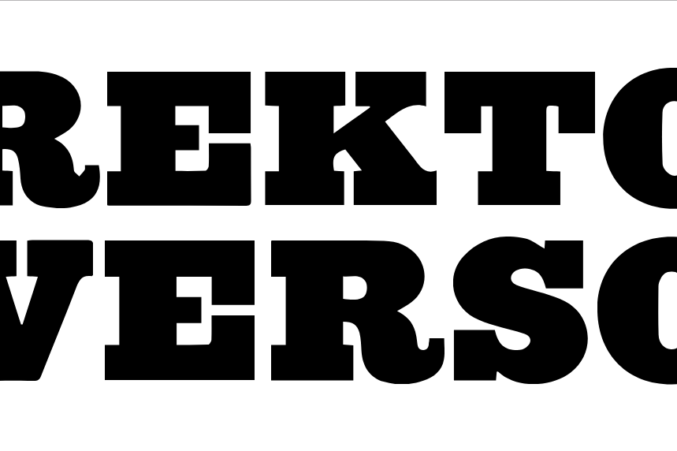
‘Success is unhealthy for me. If too many people start loving my songs, I get the feeling they are no longer mine.’ That fear does not stop artistic jack-of-all-trades Rudy Trouvé from climbing every stage, no matter how small, with a now countless number of bands and producing music at a pace the late Frank Zappa could learn from. For Trouvé, that paradox not only rings true, it also lies at the heart of his recent work. Songs and Stuff Recorded Between 2003 and 2007 is the (provisional) last part of a trilogy, and don’t expect wide-legged stadium rock and sing-alongs on it. With this record, Trouvé appears to have found a kind of tranquillity, a balance that, despite the time span in which the album was recorded, was sometimes lacking on the two earlier volumes, 1999-2002 and 2002-2003.
Even though his name will not appear in all official music annals, Trouvé has definitely earned his spurs in the Belgian scene. With bands like Dead Man Ray and Kiss My Jazz, he made records that are more than a footnote in the country’s music history. But above all, he is of course the man who gave dEUS the contrary sound on his debut Worst Case Scenario. His lack of star power means that few can remember Trouvé. Yet he was the guitarist who larded dEUS’ pop songs with a ramshackle guitar sound and tiny miniatures. He was the man who turned ‘Hotellounge’ into an indestructible classic and powered ‘Let’s Get Lost’ with screeching strings. Trouvé was instrumental in the success of dEUS, which rightly still sells out venues in no time at all, and that success was precisely the reason why he decided to leave the band in 1996. Playing the same songs night after night in front of a previously raving audience is not his idea of fun. And with Trouvé’s departure, improvisation disappeared more and more from dEUS, which I still find a pity. Fortunately, he was able to express himself on Heavenhotel, the self-sustaining record label he founded with a number of fellow musicians. In as inventive as several bands, he has been able to indulge his creativity there for years, albeit somewhat on the margins. But Trouvé uses this deliberately chosen marginality, together with his musical companions, to let his artistic freedom run wild. Nasty garage rock with Gore Slut, chaotic improvisations with Kiss My Jazz, and now also a deliciously intimate cocktail album with the Rudy Trouvé Septet.
Eerder dan songs die je luidkeels mee staat te brullen met een aantal gelijkgestemde zielen, laten de nummers op 2003-2007 zich neuriën, een sport die toch meestal individueel beoefend wordt. Het zijn gezellige melodietjes voor tijdens de afwas, het snoeien van een haag en andere dagdagelijkse bezigheden. Dat alledaagse element schuilt ook in de teksten van de Antwerpenaar. Zijn teksten bulken van plotse, schijnbaar lukrake gedachten over gebeurtenissen die je op elk moment kunnen toewaaien. Het is alsof je bij Trouvé op schoot zit, je voelt je als luisteraar direct betrokken. Die intimiteit wordt nog versterkt door de ingehouden zang die de prachtige melodieën begeleidt. Zoals in opener ‘Blondie’, een solonummertje waarin hij zich afvraagt wat nu juist zijn onvoorwaardelijke liefde voedt: ‘I know that it ain’t easy, that it ain’t exactly clear. But I’m always touched by your presence, dear.’ Het broze geluid laat niet onberoerd, en ook de reprise waarmee het album afsluit, weet met extra vocalen en een donker orgeltje dezelfde gevoelige snaar te raken. Ronduit prachtig in al zijn eenvoud. Ook in het swingende ‘Till the Next Time Around’ klinkt Trouvé verstild, een keuze die overigens zijn relatief beperkte zangkwaliteiten ten goede komt. De muziek heeft een aanstekelijk arrangement, waarbij gitarist Elko Blijweert jazzy riedeltjes uit zijn instrument tovert en Sigrid Van Rosendaal het mellow geluid van de betreurde trompettist Chet Baker sterk benadert.
Rather than songs you stand loudly roaring along with a number of like-minded souls, the songs on 2003-2007 allow themselves to be hummed, a sport that is mostly practised individually anyway. They are cosy tunes for while doing the dishes, trimming a hedge and other everyday activities. That everyday element also lurks in the Antwerp native’s lyrics. His lyrics brim with sudden, seemingly haphazard thoughts about events that could blow your mind at any moment. It is like sitting on Trouvé’s lap; as a listener, you feel directly involved. This intimacy is enhanced by the restrained vocals that accompany the beautiful melodies. Like in opener ‘Blondie’, a solo number in which he wonders what exactly fuels his unconditional love: ‘I know that it ain’t easy, that it ain’t exactly clear. But I’m always touched by your presence, dear.’ The fragile sound does not leave you unmoved, and the reprise with which the album closes also manages to strike the same sensitive chord with extra vocals and a dark organ. Downright beautiful in all its simplicity. Trouvé also sounds hushed in the swinging ‘Till the Next Time Around’, a choice that incidentally benefits his relatively limited vocal qualities. The music has a catchy arrangement, with guitarist Elko Blijweert conjuring jazzy tunes from his instrument and Sigrid Van Rosendaal strongly approximating the mellow sound of the lamented trumpeter Chet Baker.
What is striking, despite the septet’s diverse styles, is the consistent sound that underpins the album. The dreamy instrumental ‘The End of a Sweltering Day’, bossa nova in ‘Carsong’, Ennio Morricone-like country in ‘Theme From the Narrow Gate’ – it all passes by. And in both English and French. It sounds like a bizarre ratchet toe, but it works, not least because of the choice of a slightly more polished final production. Trouvé’s earlier songs often suffered from an overly emphatic lo-fi sound and the use of poor recording equipment that stifled the splendour of his songs. A brutal form of beauty was always there, only as a listener you had to patiently scratch the crust off it. In contrast to that body of work, 2003-2007 sounds almost cosy! But Trouvé wouldn’t be himself if he didn’t infuse the record with a few tensile bombs. Pretty much after every song, the septet jerks the string. They are short improvisations, prompted by completely screwed-up instructions from Trouvé himself: ‘It may sound like a heavy-metal band, which has just spent seven months in a stinking tour bus, and is in danger of becoming slightly schizophrenic’, and such nonsense. ‘Fall Down’, for example, also effectively sounds like a music toy rolling down the stairs, and ‘Sounds Like Portuguese’ will never get the award for the most abstract title in Belgian music history. Previously, jokes like this could rarely charm, but now these musical eruptions have their uses: they keep you on your toes, they are well-aimed coughs to counteract the slackening of attention.
Textually, too, 2003-2007 is much more consistent and, as far as I am concerned, accessible. Gone are the abstract comparisons that apparently have meaning only for Trouvé. You’ll never catch Trouvé on Great Stories and Feelings, but on his latest record he even chooses not to hide his mundane stories behind or under voice modifiers or layers of deranged strings. That, too, shows audacity. On stage, however, Trouvé is anything but a folksy crowd-pleaser. He does try to explain the songs with his special humour, but the clumsiness with which he does so immediately makes it clear that he would rather not explain than explain, and that he is not very good at performing – or at least at the social aspect of it. He often used to cover up this insecurity literally and figurely with a considerable amount of cigarettes and alcohol. We saw the effects of this a few years ago during a Gore Slut performance at the Dour festival. The alcohol and nicotine combined with an overheated festival tent made this event an equally memorable and hilarious performance. In the meantime, however, Trouvé became a stay-at-home dad, and that event also changed him. It is said that this is when a person discovers the meaning of life, and this positivity translates into endearingly simple stories about life, love, and offspring. As in ‘One Day Our House Will Become so Heavy it Will Sink into the Earth’,
a reflection on the uncontrollable collecting frenzy of little ones. ‘You collect snails and stones, and you fill our house with them / Every piece of paper that you found, you used to draw on’ it sounds, with children’s voices gaily cooing in the background. It paints a picture of the chaotic family, as the apple does not fall far from the tree. It suggests that the Trouvé mansion is crammed with useful and mostly unusable trinkets of all kinds, of a diversity that is also reflected in Dad’s music.
The only constant in the 1999-2007 saga seems to be the beautiful artwork in which Rudy Trouvé invariably wraps his albums. True to Heaven Hotel’s DIY principle, Trouvé has from the very beginning been providing every single, record and EP released by bands to which he belongs with unique covers. The most famous example of this is undoubtedly the little devil in a lake of fire that adorns the dEUS debut. Trouvé is anything but an undeserving painter, and each of the trilogy CDs features his own work. The boxes are always colourful, the characters angular cartoon characters invariably sweating in a far too small frame. It seems as if they could jump right out of the picture. That bustle is at odds with the melancholy and loneliness found on the back cover. Each of the three discs features a self-portrait. A drab face, thick bags under the eyes, a bottle in hand The image Trouvé paints of himself in those portraits shows low self-esteem, insecurity, tristesse. His songs and painting remain snapshots of a life translated into both music and images. Both attempt to provide a handhold, good and less pleasant memories alternate, but by immortalising them on paper and tape, they have gained a place in Trouvé’s world. Just as a photo album and a diary provide solace for many. And precisely this idea is at the heart of Trouvé’s work: somewhat uncomfortably, Rudy Trouvé lets others read and look through his journal, but at the same time he knows it is his main artistic source.
Maarten Demetter
This article appeared in Rekt:verso




